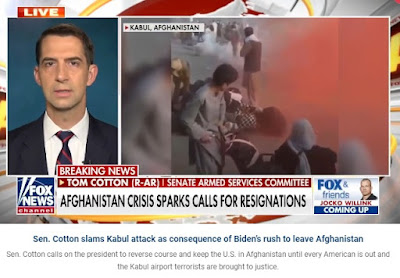Hiding behind his tears — Sorry Biden’s decisions led to Kabul carnage: Goodwin
The Memo: Horror in Kabul is political disaster for Biden
President Biden promised the United States would not suffer a “Saigon moment” as it withdrew from Afghanistan.
The reality has proven even bleaker.
The attacks committed around Kabul’s airport on Thursday are a human tragedy. They are also a political catastrophe for the president.
At least 13 U.S. personnel have been killed and 15 wounded. The death toll among Afghans climbed to at least 60 according to some reports on Thursday, with more than 140 wounded. The Islamic State has claimed responsibility for the bombings.
The American people broadly agreed with Biden’s decision to end the war in Afghanistan, which is nearing its 20-year anniversary and is the longest in the nation’s history. It had already cost more than 2,400 American lives and more than $2 trillion.
It is also true — as Biden noted once again in a White House news conference late Thursday afternoon — that it was then-President Trump who did the deal with the Taliban for a full American withdrawal, which had been scheduled to take place even earlier, in May.
But none of that absolves Biden of responsibility for a pullout that has been, by any reasonable measure, a debacle.
Events from the past few weeks will be seared into the public memory through a series of appalling images: Desperate Afghans clinging to a taxiing U.S. military plane on a runway, and some falling from it soon after takeoff; an infant being hoisted over razor wire toward a group of Marines; and the carnage of Thursday’s attacks.
The end, for America in Afghanistan, is in sight. Biden’s Aug. 31 deadline is just five days away and he has so far rebuffed allies who want him to extend it. But reaching the endpoint may involve navigating fresh horrors.
At a Pentagon briefing Thursday, Gen. Kenneth McKenzie, head of U.S. Central Command, warned of “very, very real threats” of more attacks that “could occur at any moment.”
Biden sought to steady the ship with his remarks from the White House, where he called for the nation to “remain steadfast.”
He also cited his own experience of losing his son Beau — an Army major — to brain cancer as he sought to empathize with the families of the “heroes” who were killed in Afghanistan on Thursday.
But it was also an address that never quite seemed to match the magnitude of the moment. Biden at times appeared tired. His pledge to exact retribution for the attacks seemed to ring hollow with his own deadline for U.S. withdrawal so close.
The White House had been seeking to wrestle some kind of political victory from the jaws of defeat in Afghanistan in recent days, emphasizing the numbers of people who had been evacuated.
Those numbers are, to be fair, impressive. Since Aug. 14, more than 100,000 people have been evacuated directly by the U.S. military or had their evacuations facilitated by the U.S., according to the White House. Even on Thursday, about 7,500 people were evacuated from Kabul in a 12-hour period.
Yet, the idea that the final U.S. operations were going to be seen as some kind of against-the-odds moral victory — the British evacuation of Dunkirk and the Berlin airlift were the two historical parallels most often cited by voices sympathetic to the White House — vanished in the dust of the airport attacks.
There is no clear historical analogue, though perhaps the closest is the 1983 truck bombing of the U.S. Marines barracks in Lebanon. The death toll in that instance was much higher, at 241 American service members, but the shock and trauma bears some comparison to Thursday’s attacks.
Republicans are ramping up their already vigorous criticisms of the president.
The Republican National Committee’s communications director, Danielle Alvarez, blasted Biden’s White House remarks as “incoherent.”
Earlier, Sen. Josh Hawley (R-Mo.), who infamously offered a clenched fist salute to the crowds that would later riot at the Capitol on Jan. 6, has called for Biden to resign. So too did Sen. Marsha Blackburn (R-Tenn.). Sen. Lindsey Graham (R-S.C.) wants the president to be impeached.
The Republicans know there is no realistic chance of either one happening anytime soon. But their rhetoric speaks to their sense of Biden’s weakness as he is rocked by the first self-inflicted crisis of his presidency.
Up until a few weeks ago, Biden had held decent and stable approval ratings, having won widespread backing for his response to the COVID-19 pandemic.
But politics changes with astonishing speed.
It’s possible that it will change again.
The Afghanistan withdrawal could fade from the headlines, and from voters’ minds, sooner than some might think. There are plenty of political observers who doubt that it will be a big issue six months from now, and certainly not in the midterm elections set for November 2022.
Maybe that will turn out to be true.
But it is just as plausible that the chaos of Kabul has left a taint of weakness and incompetence on the Biden White House that will not be erased soon, if at all.
For now, the only thing certain is that the toughest stretch of Biden’s presidency to date just got even worse.
The Memo is a reported column by Niall Stanage.

No comments:
Post a Comment
All comments must not use profanity and must not be defamatory. Please respect the rights of people who may have different opinions than you do.